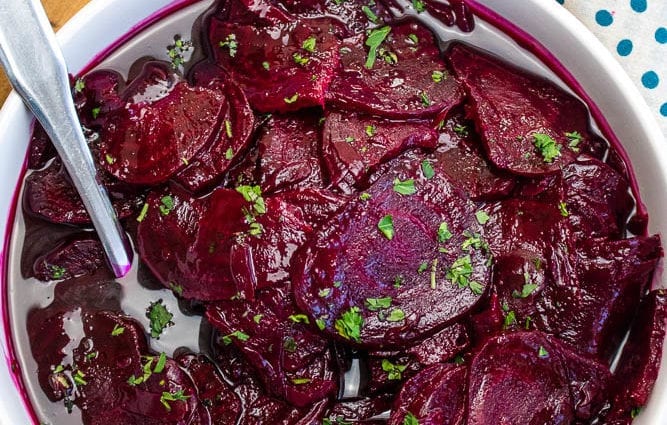Nutritional value and chemical composition.
The table shows the content of nutrients (calories, proteins, fats, carbohydrates, vitamins and minerals) per 100 grams edible part.
| Nutrient | Quantity | Norm** | % of the norm in 100 g | % of the norm in 100 kcal | 100% normal |
| Calorie value | 73 kCal | 1684 kCal | 4.3% | 5.9% | 2307 g |
| Proteins | 0.84 g | 76 g | 1.1% | 1.5% | 9048 g |
| Fats | 0.06 g | 56 g | 0.1% | 0.1% | 93333 g |
| Carbohydrates | 15.68 g | 219 g | 7.2% | 9.9% | 1397 g |
| Alimentary fiber | 2.5 g | 20 g | 12.5% | 17.1% | 800 g |
| Water | 80.16 g | 2273 g | 3.5% | 4.8% | 2836 g |
| Ash | 0.76 g | ~ | |||
| Vitamins | |||||
| Vitamin A, RE | 1 μg | 900 μg | 0.1% | 0.1% | 90000 g |
| Vitamin B1, thiamine | 0.01 mg | 1.5 mg | 0.7% | 1% | 15000 g |
| Vitamin B2, riboflavin | 0.05 mg | 1.8 mg | 2.8% | 3.8% | 3600 g |
| Vitamin B5, pantothenic | 0.15 mg | 5 mg | 3% | 4.1% | 3333 g |
| Vitamin B6, pyridoxine | 0.055 mg | 2 mg | 2.8% | 3.8% | 3636 g |
| Vitamin B9, folate | 29 μg | 400 μg | 7.3% | 10% | 1379 g |
| Vitamin C, ascorbic | 2.4 mg | 90 mg | 2.7% | 3.7% | 3750 g |
| Vitamin PP, NE | 0.084 mg | 20 mg | 0.4% | 0.5% | 23810 g |
| Macronutrients | |||||
| Potassium, K | 164 mg | 2500 mg | 6.6% | 9% | 1524 g |
| Calcium, Ca | 11 mg | 1000 mg | 1.1% | 1.5% | 9091 g |
| Magnesium, Mg | 19 mg | 400 mg | 4.8% | 6.6% | 2105 g |
| Sodium, Na | 162 mg | 1300 mg | 12.5% | 17.1% | 802 g |
| Sulfur, S | 8.4 mg | 1000 mg | 0.8% | 1.1% | 11905 g |
| Phosphorus, P | 17 mg | 800 mg | 2.1% | 2.9% | 4706 g |
| Trace Elements | |||||
| Iron, Fe | 0.36 mg | 18 mg | 2% | 2.7% | 5000 g |
| Manganese, Mn | 0.241 mg | 2 mg | 12.1% | 16.6% | 830 g |
| Copper, Cu | 97 μg | 1000 μg | 9.7% | 13.3% | 1031 g |
| Selenium, Se | 1.1 μg | 55 μg | 2% | 2.7% | 5000 g |
| Zinc, Zn | 0.23 mg | 12 mg | 1.9% | 2.6% | 5217 g |
| Essential Amino Acids | |||||
| Arginine * | 0.022 g | ~ | |||
| valine | 0.029 g | ~ | |||
| Histidine * | 0.011 g | ~ | |||
| Isoleucine | 0.025 g | ~ | |||
| leucine | 0.035 g | ~ | |||
| lysine | 0.03 g | ~ | |||
| methionine | 0.01 g | ~ | |||
| threonine | 0.025 g | ~ | |||
| tryptophan | 0.01 g | ~ | |||
| phenylalanine | 0.024 g | ~ | |||
| Replaceable amino acids | |||||
| alanine | 0.031 g | ~ | |||
| Aspartic acid | 0.06 g | ~ | |||
| glycine | 0.016 g | ~ | |||
| Glutamic acid | 0.222 g | ~ | |||
| Proline | 0.022 g | ~ | |||
| serine | 0.031 g | ~ | |||
| tyrosine | 0.02 g | ~ | |||
| Cysteine | 0.01 g | ~ | |||
| Saturated fatty acids | |||||
| Saturated fatty acids | 0.009 g | max 18.7 г | |||
| 16: 0 Palmitic | 0.008 g | ~ | |||
| Monounsaturated fatty acids | 0.011 g | min 16.8 г | 0.1% | 0.1% | |
| 18: 1 Olein (omega-9) | 0.011 g | ~ | |||
| Polyunsaturated fatty acids | 0.019 g | from 11.2 to 20.6 | 0.2% | 0.3% | |
| 18: 2 Linoleic | 0.018 g | ~ | |||
| 18: 3 Linolenic | 0.002 g | ~ | |||
| Omega-3 fatty acids | 0.002 g | from 0.9 to 3.7 | 0.2% | 0.3% | |
| Omega-6 fatty acids | 0.018 g | from 4.7 to 16.8 | 0.4% | 0.5% |
The energy value is 73 kcal.
- cup slices = 246 g (179.6 kCal)
Harvard beetroot, canned rich in vitamins and minerals such as: manganese – 12,1%
- Manganese participates in the formation of bone and connective tissue, is part of the enzymes involved in the metabolism of amino acids, carbohydrates, catecholamines; essential for the synthesis of cholesterol and nucleotides. Insufficient consumption is accompanied by a slowdown in growth, disorders in the reproductive system, increased fragility of bone tissue, disorders of carbohydrate and lipid metabolism.
Tags: calorie content 73 kcal, chemical composition, nutritional value, vitamins, minerals, what is useful Harvard beet, canned, calories, nutrients, useful properties Harvard beet, canned










